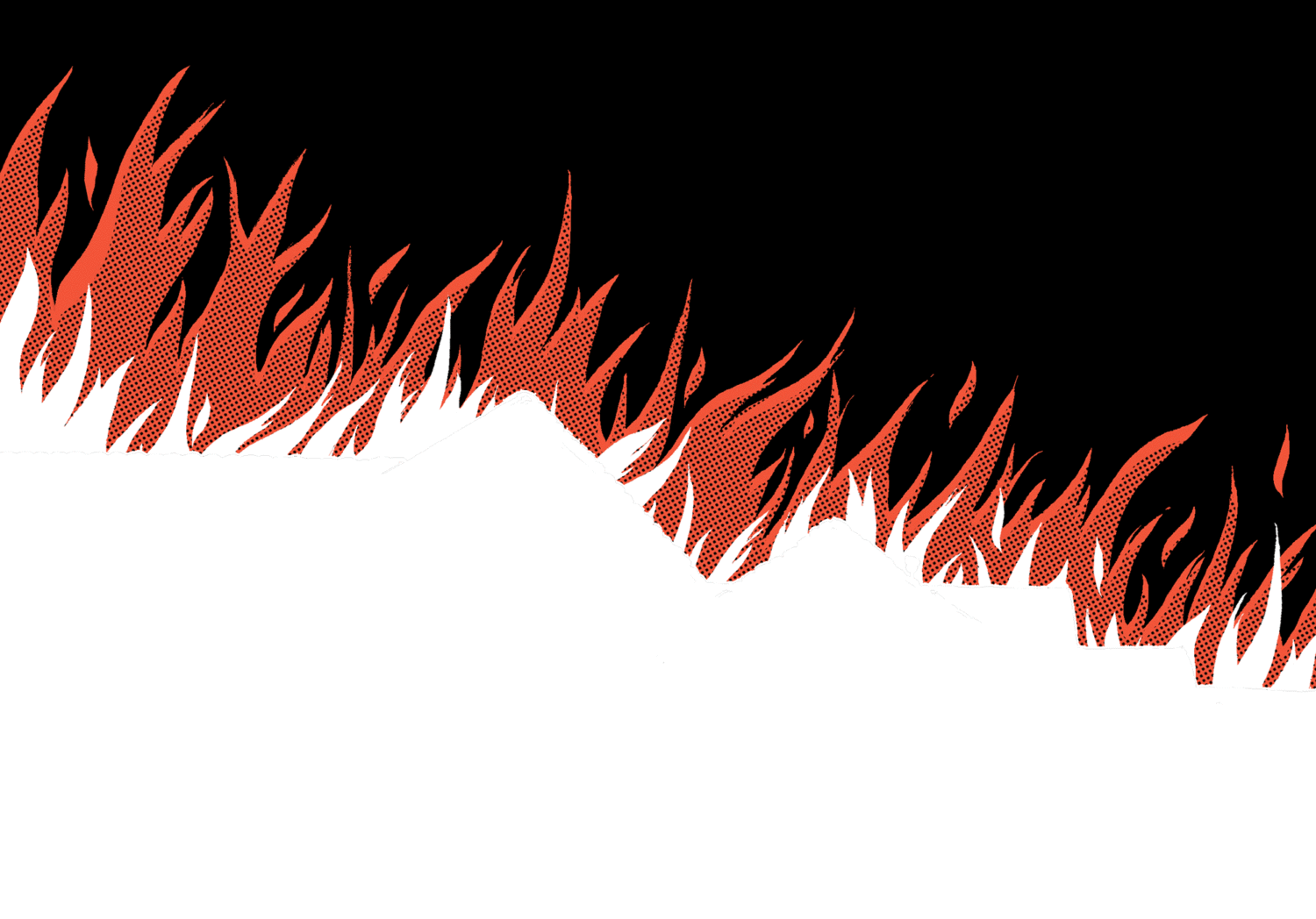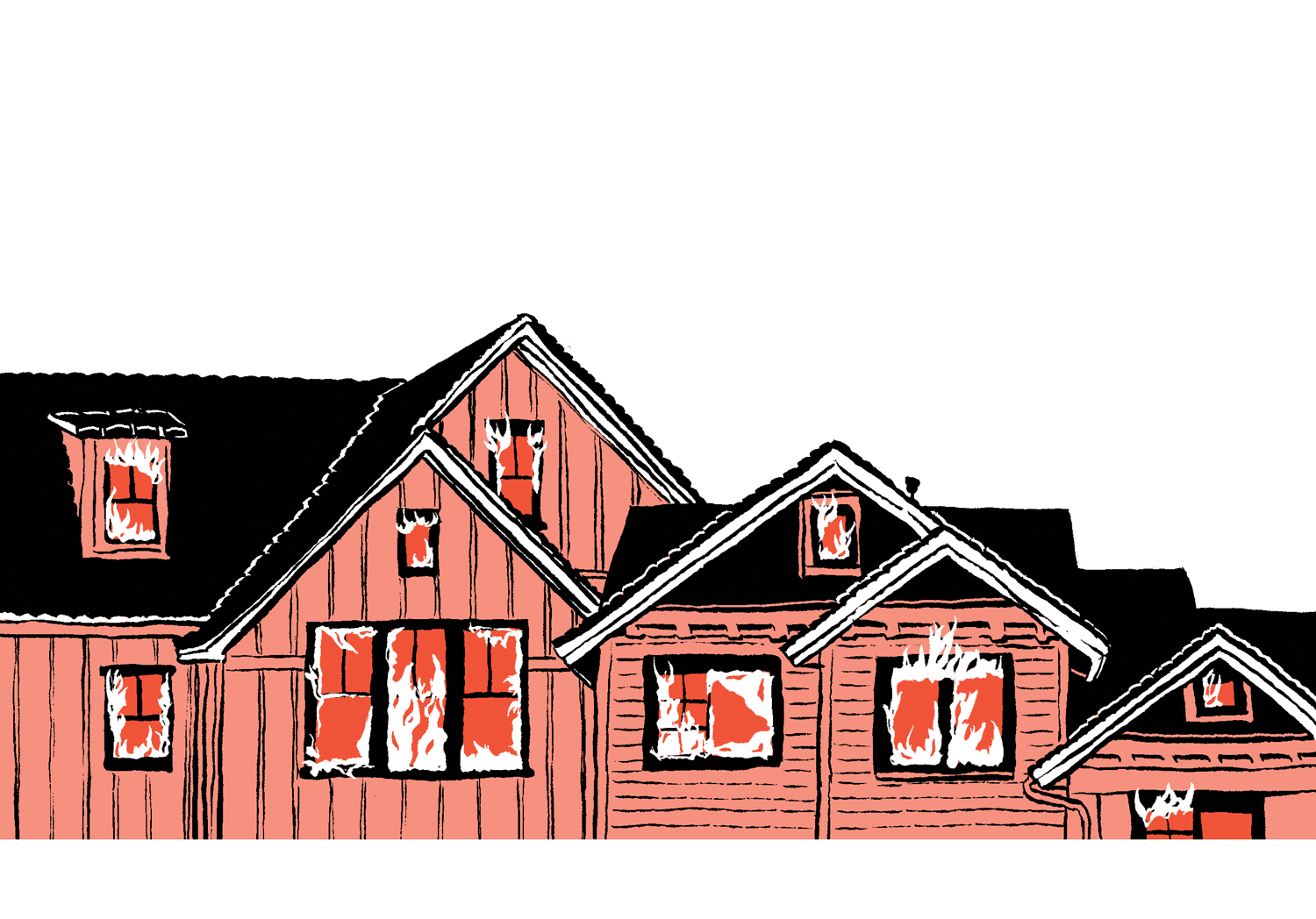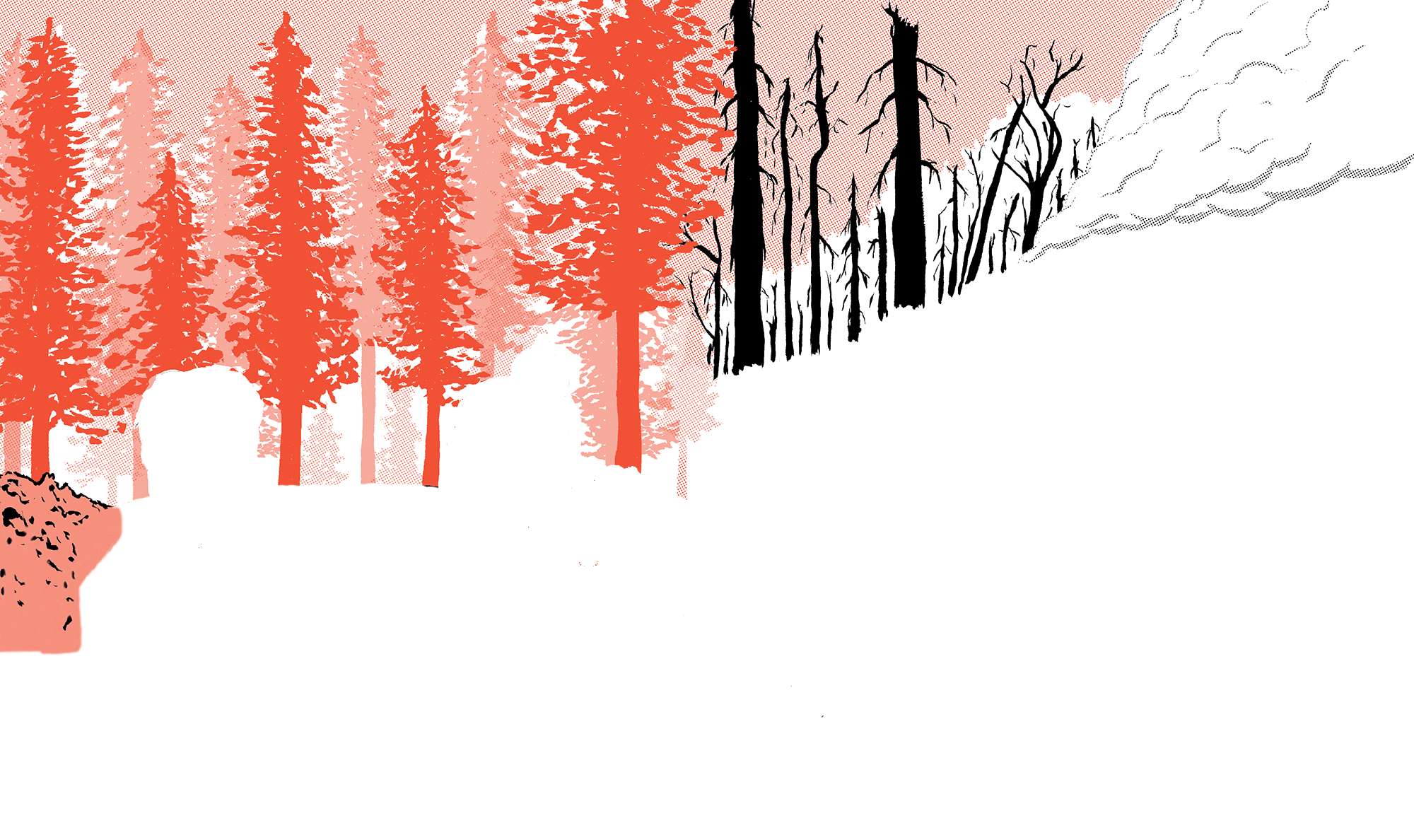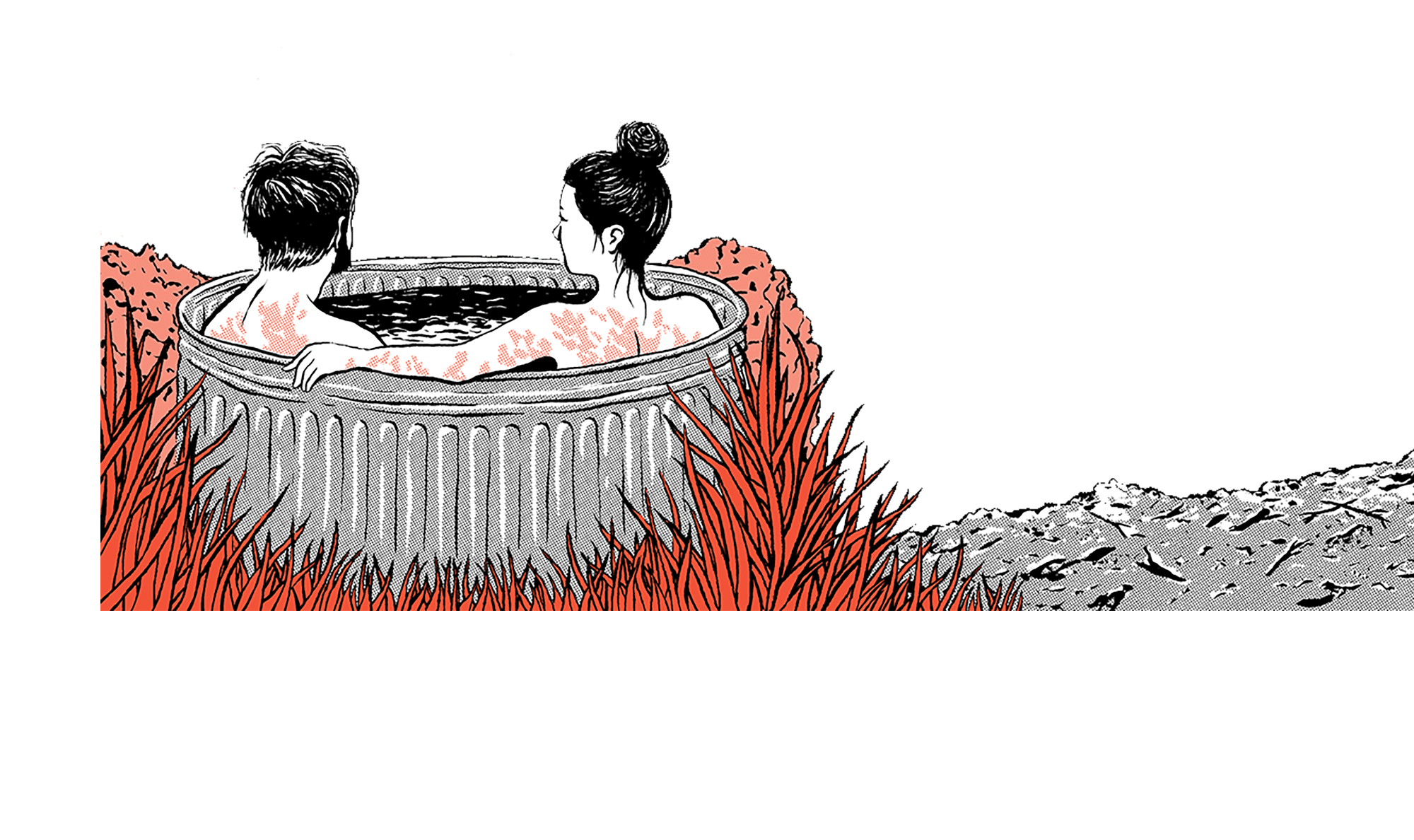Objects of Fire
In Berry Creek, it came in the middle of the night. In Paradise, at 8 a.m.—some people had already left for work; some weren’t yet awake. In the hills of Sonoma County, a woman looked up and saw flames reflected on the smoke above and knew it was coming. In Boulder Creek, the fire had been burning for a week, the skies tinted orange, before winds shifted suddenly and sent blackened leaves to crumble to ash on the ground. And then it was time to go.
In California, wildfire has always been a fact of existence. Every year, from June through September, some sky somewhere in the state fills with smoke. But since 2017, when the Tubbs Fire tore through Santa Rosa, fires have shifted from the periphery of collective attention into the burning spotlight. Unlike those in years before, the Tubbs Fire did not confine itself to wildland but cut its path through a city. And unlike fires in years before, it came so fast that people didn’t have time to get out. Some took shelter in swimming pools while the flames washed over them. Twenty-two people died. At the time, it was the most destructive wildfire in California history.
In the background was the increasingly visible presence of climate change. Heat records were set and then broken across the state; drought became the norm; winters seemed to skip years. The anomaly of the Tubbs Fire lasted just over a year. One season later, the Camp Fire destroyed swaths of the town of Paradise and the surrounding rural communities in minutes, burning the length of a football field every two seconds. It became the new most destructive fire in California’s history. Eighty-six people died; almost everyone in town who remains has a story about a narrow escape through the flames. Since then, the forecasts no longer try to determine whether a fire will strike, but when and how it will come, what communities will be next, and what will happen if nothing changes.
By 2020, it was clear that nothing had changed. Last year, some 9,917 wildfires burned more than 4.2 million acres across California, taking thirty-three lives and more than 10,488 homes and structures. For months, the state glowed red. Every week, it seemed, another rural community turned to ash. Fire crept into the state’s cool coastal stretches. It seeped into the cities. It stayed through the summer months and past. Now California exists in a perpetual fire season.
For me and many other Californians, our new reality is a widening expanse of loss. You either know someone or you are someone who’s lost everything. I’m one of the former group—my childhood home survived the 2018 Camp Fire while many of my neighbors’ homes burned. After, I kept hearing the same proclamations of luck from the people around me. “Yes, we lost our home,” people would say, “but that’s just things.Things can be replaced.”
These statements of relative good fortune make sense. No one who’s lived through these fires had the privilege of waiting, of forewarning. There was just the fact of it—fire pouring down a mountain or through trees like water, and minutes to not find yourself within it. Making it out meant you survived when many didn’t. When so much has been lost, how can you justify grieving a few inconsequential objects?
Complete dispossession, though, is not so easy to rebound from. A thing may not be a life, but a life is built of things. Our objects are infused with our singular existence—memory, story, sentiment, belonging. They hold and write our histories, helping us explain ourselves to ourselves. Spoken words and lived events are ephemeral. But objects remain solid. That’s why we keep them so close. At least, until a wildfire burns them back to nothing.
In California’s recent wildfires, untold numbers of personal objects have become symbols of lost histories. But there hasn’t been much space to mourn them. With this in mind, I set out to collect some of the memories held in these objects. What follows is a small archive of life, as told through what has been lost.
THE MIRROR
Teresa Pressler lived in Berry Creek for seven years. In September 2020, the Bear Fire arrived without warning, and she fled in the night. All that survived of her home were solar lanterns marking her dog’s grave and a Weber grill. She misses her garden, among many other things.
There’s no way to describe the fear. I had minutes to get out and get my things and be responsible for my eighty-four-year-old mother and my husband and my son and my dogs. I got them out first, then some medication, and that’s all we had time for.
I’m trying to hurry and get my mom out. I’m telling her, “Look, we don’t have time, just go, get out the door.” She put on two different shoes—a white slip-on sandal on one foot, and a navy blue leather heel on the other. That’s what she left with. I felt so bad for her. I felt so horrible that I could do that to my mother. Since then I’ve bought her about six pairs of shoes. She says she forgives me. “Stop with the shoes. I forgive you. Stop with it.” But in her era, people were vain about how they looked. She always had her hair done and her makeup on and she was always dressed well. She wears nice scarves, and cardigans that match her shirt and her pants. She still wears heels. All the women in my family dressed well. My great-great-great-grandmother had a mirror she’d brought over from Sicily. So many of the women in our family got dressed in front of that mirror, looked at themselves in it. Every month my mom would unwrap the mirror to look at it. It was round, with carved metal roses painted gold around the frame, in pristine condition. Of course it wasn’t saved. The night of the fire, after we made it out of the house, my mom said, “How could you do this to me? Look at my shoes!” And I said, “I’m so sorry, Mom.” I said, “You can kill me later, but right now we’ve got to get off this mountain.”
THE POEMS
Devi Pride is a photographer. The CZU Lightning Complex Fire consumed her home in the small mountain community of Boulder Creek in September 2020, just a few months after she moved there.
I had been living in an apartment that had mold and I got really sick. So I went to live in a house on my family’s land. It was beautiful, a place of healing. For two and a half months, I washed every single thing I owned to get rid of the mold spores—delicately cleaned them and held them and looked at them. It was tedious work, and I was so upset, but then I thought, You know what? Now I’m going to appreciate these things more. Then, a week after I finished, the fire happened.

My dad passed away when I was young. I had poetry he had written and typed on an old typewriter.
Days before the fire, I was sitting outside scanning photographs. I’m a photographer, so I was trying to preserve my work from the mold situation. But when I got to my dad’s poetry, because of that paper—that thin, thin paper with these little holes in it that you put in the old typewriters—I got worried I was going to damage it in the scanner. I’d been wanting to publish it one day, and so I thought I would take it somewhere and get it properly scanned so the originals stayed intact. I wrapped it up and put it away. I had the poems folded between the pages of a book because I planned to sit down and read them someday. I never really got to read them all. As we drove off, I remembered and said, “My dad’s poetry! I left it!” My partner said, “Should we go back?” But the fire was coming. I didn’t turn back.
After the fire, we went up there and dug in the hot sun for about seven hours. But it was just ashes. It was surreal. Where I once stood, now it was ashes. My dad’s poetry was still lying there in that open book—I saw it. The pages were there, but the words were gone. When I touched the pages, they disintegrated. They were just ash.
After the fire, at first I mourned the loss of my things. But I realized that, ultimately, my attachment to things was because of the memories in them. With my dad’s poetry, though, I don’t have the memory of it. I didn’t get to read it all. I didn’t get to feel it, experience it, and then let it go. And now it’s gone.
THE BAGPIPES
Tom Parker spent twenty years in the army and is a retired firefighter. When he was learning to play the bagpipes, he was glad to be living on five acres of land in Berry Creek—out of earshot of all his neighbors. His home burned in the Bear Fire in September 2020.
The day of the fire, my friend and I stayed up there to fight it. We had done our homework around the house, fire-wise. We had almost two acres of land completely cleared and masticated with a chipper. Nothing over two inches was standing. I felt pretty damn confident the house would survive—so confident that the only things I put in my truck were the most important paperwork and a few small items. But everything else? It was left right where it was. In my mind, we weren’t going anywhere.
When the fire came in, though, it was riding on the wind. We fought it for two hours but couldn’t get ahead of it. It completely surrounded us. We were all over the place trying to put out spot fires. Around midnight, we realized this was a losing battle. We had to get out.
We’d been living on our property for about ten years. It was bare land when we bought it. We cleared and cut and burned and groomed. When we were done it looked like a park. We put a manufactured home up there, but believe me—it didn’t look like a manufactured home when I was done with it. I built everything else onto it and around it. I built a room off the back that was all floor-to-ceiling glass. When you walked out the back door into this big bonus room, you had a panoramic view of the canyon. It was pretty spectacular.
I built the shop, too, and made my own pub. It was my own little man cave. I had a bar, a Kegerator, fully stocked. That’s where I kept all my fire memorabilia, my military memorabilia. It was pretty much my “I love me” wall. I had a real emotional attachment to all my things. I was especially attached to my bagpipes. I lost three sets in the fire. One survived because it happened to be in my truck, but it’s the only one I don’t really care about. The bagpipes have always intrigued me; I had my first set made in Scotland right after I retired. My wife thought I was batshit crazy. She goes, “What are you gonna do with those?” And I go, “I’m gonna learn how to play them, that’s what.” And I did. That first set burned with everything else.
Our new house has already been ordered—another manufactured home. We’re moving right back. We got the ball rolling six days after the fire. I’m looking at the plans for my new shop. I’m building a greenhouse for my wife. She’s getting her own tractor. We seem to move every ten years so—time to move. Yesterday, I picked up another set of bagpipes too. I paid a hundred dollars for the set. The hide bag was completely rotted out and moth-eaten. The sticks and stalks and wood looked like crap, all dusty, dirty. But I was almost giddy. I told the guy who sold them to me, “I’m gonna make these play again.” He looked at me like I was crazy. Like, Right, you’re gonna raise the Titanic and make it float again. I spent the whole afternoon and evening tearing them apart and cleaning them up and resetting everything. Now they’re beautiful. That guy didn’t know what he had. I’m gonna play a tune for him and send it to him on Facebook. “Told ya so.”
THE POSTCARDS
Amy Thomason has spent her whole life on Spring Mountain in Sonoma County. At the time of the Glass Fire, in October 2020, she was living in her grandmother’s old cabin, on the same land as her childhood home. Both houses burned down.
My father was a musician when he was young. His band was the Michael Thomason Band. It was a country band, like classic country, not the new pop stuff. In California, people are always like, “I don’t like country.” And I’m like, “Do you like Guy Clark? Do you like Hank Williams?” And they’re like, “Yeah.” “Well, that’s real country.” It was fun growing up in my house. It was lively. There were always friends around, and late nights sitting up and playing music and, for me, listening to music. That was part my dad’s dream of having a ranch—a place where everybody was welcome. I can’t tell you how many friends my parents have taken in. It was a gathering place. And it was magical.
My dad’s whole career is gone. All the archives, all the old tapes on reels of recording sessions, all the posters. He left with three of his guitars, and my mom grabbed some of his fancy stage clothes, but the rest didn’t make it out. When I was about six, my father was on tour in Europe for six months. Every week he would send a postcard from wherever he was. They were all beautiful photos. One showed two little girls, also six years old, in traditional dirndls with ribbons in their hair. There were pictures of castles, and of a street in Bavaria with fairy-tale houses. At the time, I was learning to read. At first, he wrote the postcards in his normal handwriting, and then my mom must’ve told him I was still learning to read, so the later ones were carefully printed. He sent so many that I had a stack. They’re gone too.
Spring Mountain has always been my place. It’s the first place I came to after I was born, straight from the hospital. My husband had always wanted a ranch or a farm, and he fell in love with the property too. He used to go for walks in the forest with my grandma and let her talk about all her trees. Our property was a dreamland, like a magical fairy forest. But the fire killed 95 percent of our trees. You can see so far out now. I’ve already been planting daffodils and trying to get things in the ground so there’s something there when we do go back—when we will go back.
THE TREES
Frank Mazzarino and his wife, Sally, bought their Berry Creek property forty years ago and turned it into an organic fruit farm. The Bear Fire destroyed their home, their operational equipment, and the majority of their orchards. Their once-lush land is now an open scar on the mountain, but they think the new look holds a strange kind of beauty.
Our land was logged about ten years before we bought it, and it was still trying to recover. It was pretty trashed; there was debris all over. Fortunately, we had a creek, and down around the creek we still had some big trees. That’s where we built our house. I was involved in every phase of the build. I put in roads, put in fencing, built the house, the barn, gazebos, a guesthouse. I did the landscaping, too, so I put in trees that had some kind of meaning. Some had good fall color or spring blooms or produced good fruit. There was one peach tree that came up from seed that I let go across from the house. It produced delicious peaches. My dad came to visit one time, and he plucked one of the peaches off the tree and loved it. He died in 1999 and I wound up naming the tree after him—Sam’s Delight Peach. It was destroyed in the fire.
We got another tree—an ornamental nectarine—from a friend, Flo, an artist. She painted some pictures of Sally and of our place. Her son was a landscaper, and when he died, she gave us seeds from one of his trees. It produced these massive, beautiful white flowers. That one was too close to our house, so it burned.
Trees make great memorials. They remind us of everyone who’s gone. We’re planning to plant some new ones on the property soon. And the reality is, we’ll be gone, too, by the time anything we plant now gets to be good-sized. We don’t have another forty years. But that part’s never really been important. Just putting something in the ground feels good to do.
THE SILVERWARE
Peggy Bailey lived in a small cottage along the creek in Paradise before the Camp Fire came. She’s not sure if she’ll rebuild yet, but she created a zen garden on her plot, where her rosesbushes and lilac tree survived.
That morning, I was alone with my seven-year-old grandson and the neighborhood was already on fire. Propane tanks were blowing up and people were running. Everybody was frantic. It was dark. It went dark so fast. Driving out, what normally takes twenty minutes took us five hours. As we were weaving our way slowly, slowly to the Skyway, we saw cars on fire. It was hard to look at them.
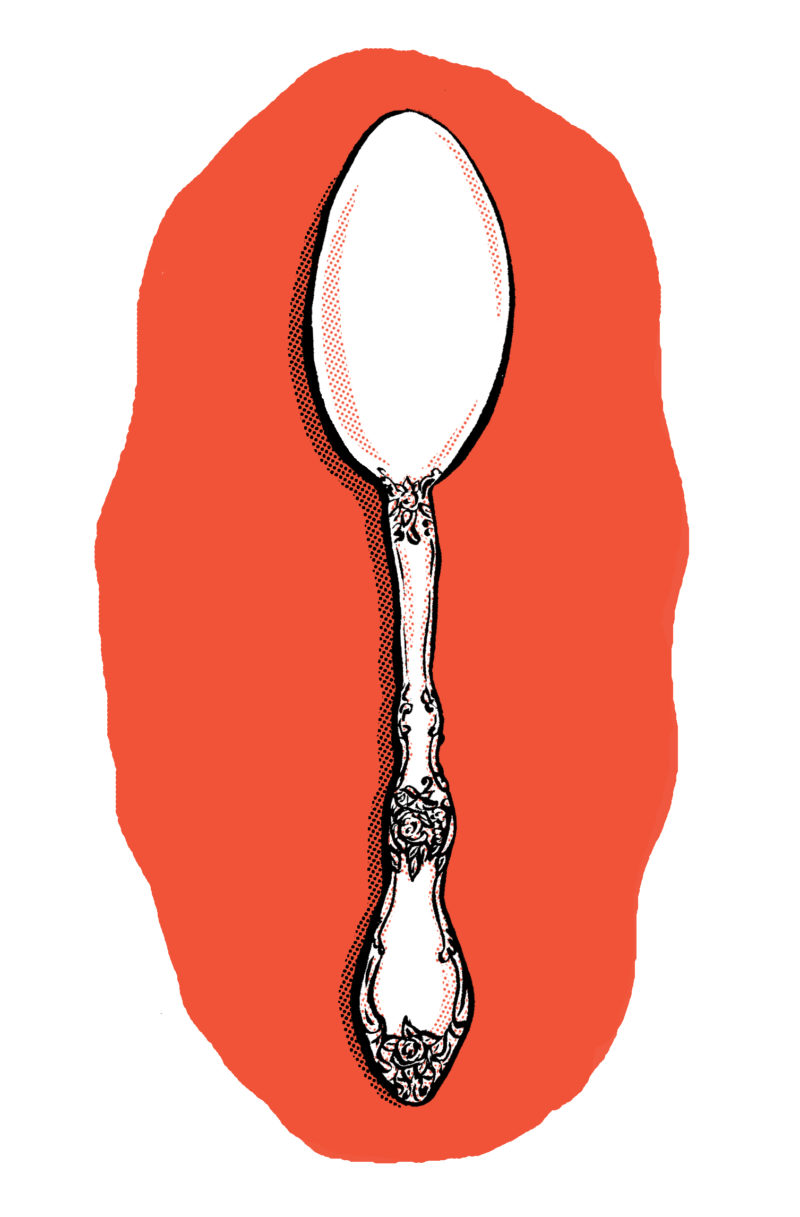
My grandson hadn’t said one word the whole time, but I knew he was observing. He’s an old soul. We got to an area where we were coming into nothing but fire, everywhere, over the cars, surrounding us, and he says, “Ya-ya, what if that tree falls on us?” I said, “It’s not going to fall. But if anything happens, we’re gonna get out. We’re gonna hold hands and run like hell.” He said, “OK.” Just then, a huge explosion shook the car. I didn’t know where it had come from. My reaction was “Holy shit!” And little Willie, out of the back seat, said, “Jesus Christ, Ya-ya!” He looked at me, I looked at him, and we both cracked up. The way he said it, I went, “Oh my god, that’s your great-grandpa talking through you!”
I was very close to my father’s mother, a spiritual woman. She taught me a lot at a very young age about who we are as humans and spirits. How we understand death. I listened to her, but I didn’t have enough experience then to understand what she was really teaching. It wasn’t until she passed and I saw her body that I got it. After she passed, I inherited her silverware. That didn’t make it through the fire. I had several of her beautiful antiques, but nothing affected me in the same way as her silverware. I was touching it; I was using it in the way she used it. Every day it was a treat to pick it up, eat with it, wash it, and think of her. When I touched it, I felt, Ah, there she is. It was the same in the car with my grandson. I knew my dad was speaking through him. There he is.
THE TUB
Jeff Phillips and Sherry Soleski lived in a 1920s hunting cabin for eighteen years before the Glass Fire. As self-described hedonists, the couple had customized their home to perfection. They’re not sure yet if they’ll rebuild.
JEFF: Our house had delicious water. It was in the middle of three creeks and our water came from an artesian spring. I ran copper lines from the spring that would gravity-feed down to a stainless steel tank that I’d had a wine-tank maker build for us. And then I had an on-demand hot water heater. By the creek by the spring, there was California ginseng, spicebush, and giant sword ferns. We put a stock tank there to use as a tub. It was just the right depth—we could sit in it up to our shoulders and we could stretch our legs out. We’d be soaking in water right next to the creek. On full moon nights, the moonlight would come through the redwood branches and throw shadows on us. Sherry called them moonlight tattoos. Redwood moonlight tattoos.
SHERRY: After the fire, I hated it up there. I couldn’t feel the love I had felt for that property. It was freaking me out that I couldn’t find that in myself. Part of it, I realized, was the smell. Even if you closed your eyes, you couldn’t get away from all the burn. I heard so many of our neighbors would go up and look to save anything they could find. But I was repulsed. I didn’t want to salvage anything from the house—I wanted my memories to be from when everything was useful and beautiful.
One night years ago, I had come home from working a catering job and I was making supper. We didn’t have any curtains because we lived in the country. It was winter, dark out, so I could see my reflection in the glass. I looked at myself and all of a sudden, I had this thought: I am living the life that I’ve wanted to live my whole life. It was perfect. That’s how I want to remember it.
THE BARN
Linda Aldrich has spent more than thirty years on her six-acre ranch in Sonoma County, where she runs programs to bring kids together with a band of twelve horses she rescued from neglect. She’s now living in an RV on the ranch, which burned in the Glass Fire, and says she’s just happy to be home.
The night of the fire, I had to leave with just my dog and my truck. I had to leave all twelve of my horses behind. I just opened up the gates to the six acres and prayed. It was the longest and worst night of my life, not knowing if my horses had survived. The next morning, I kept waiting for somebody to reach out to me, a police officer, a fireman, someone. And my phone was silent. It was probably five in the morning when I finally got Sonoma Community Animal Response Team, a rescue organization that evacuates animals, on the phone. I was asking about my horses and I heard the woman take another call. It was a highway patrolman saying, “We have twelve horses that need to be evacuated.” I was so grateful. After that, it was like, OK. I don’t care what else happens. They’re alive.
Horses are amazing healers. Horses live in their bodies. Communicating with them is all about body language. I tell the kids that horses need you to do something different. And usually, you just need to breathe. When you’re holding your breath, you’re holding on to all this emotional baggage. That’s heavy for the horse. And if it’s heavy for the horse, it’s heavy for you too. So just breathe, and let it go. When the kids do that, that’s when I see them smile. That’s when I see them having fun. And that’s when I know the horses are helping them heal.
A barn out in our field burned. The walls on the inside were covered with artwork from all the kids from our programs throughout the years. Every summer we’d get out the paint and the kids would add to the wall. They’d written their names, written their horses’ names. They did the cutest pictures of their horses, personalized their signatures, wrote what their horses meant to them. It was a record of years of kids connecting with their horses.
This ranch has been home to a lot of folks. And it’s home to the horses too. The first day I brought them back, after the fire, they walked into the field and all lay down on the ground. It was like they were hugging the earth.
THE PICTURE
Mike Richards had moved into his newly-built home eleven months before it burned. He was born and raised in Paradise. In some ways, he feels like the Camp Fire gave him his old, quiet town back. But he’s not really happy about it.
My great-aunt Esther was a nurse in World War I and went back to be a nurse in World War II. She died as a nurse overseas. Back in the nineteen-teens she would have been around seventeen or eighteen. She gets her nursing license and goes to war and works in a field hospital in France. Then she comes back, goes to Columbia University, and gets her master’s degree in sociology. Then she goes to work for the Veterans Administration in San Francisco, helping people from the bombing at Pearl Harbor cope. Then she immediately says, “I want to sign back up for the Nurse Corps,” and they won’t let her in because she’s forty—too old for the army to take her. So she joins the American Red Cross and signs up to work in the field hospital, out in battle zones. She goes to North Africa, gets on a hospital ship that was bombed off the coast of Salerno, Italy. She could’ve gone back home, but, no, she goes back to her unit, back to the evacuation hospital, and lands on the beach at Anzio. A week later, Anzio gets bombed and she gets killed. She was the first female Red Cross worker killed in action in World War II.
There was a picture of her taken at Anzio beach. Because of all the flack that was pelting the tents, they dug foxholes underneath their cots in their tents. The photo shows her looking out of her foxhole under her cot. That picture was taken two hours before the hospital was bombed. The last picture of her. It wasn’t only great family history, but great history. And now it’s gone.
My aunt is, in part, the reason I got my EMT license and worked for seven years with the Butte County Fire Department. It was because of the things she did. She was somebody to look up to. Now I say I’m entirely blessed because, the day of the fire, I had the chance to get out of Paradise and come back, then get out again. It was because I could see what was coming. My brain was telling me, Yep, this is the big one. Time to go.
THE BELT BUCKLE
Jess Mercer is an artist who comes from a line of goldsmiths. After the November 2018 Camp Fire, she built a sculpture of a phoenix made out of now-useless keys to homes in Paradise that were lost. It serves as a memorial.
My grandfather made a belt buckle at least a hundred years ago. It was the first thing ever forged in my family. He made it from scratch, very old-school, hammered it, put turquoise in it. He said, “The day I stop doing jewelry, I’m going to give you this to remind you why I did jewelry.” The day of the fire, my dad threw the buckle into one of our firing ovens that can withstand four-thousand-degree heat. He thought it wouldn’t perish in there. When we got back to our property, we immediately went to the oven and pried it open. The buckle had completely melted. That was a sign that this fire was such a beast—hotter than even this oven was made for. It was a different kind of closure, though, to know that there truly wasn’t any hope of anything being saved. A natural disaster, to me, felt like the easiest way to let go of something I never thought I’d have to. There’s no wonder after a fire. It’s just complete.

